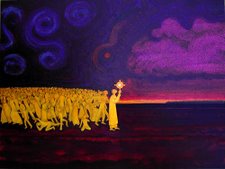
Just getting into this. I highly recommend it:
“Arise, my love…”: Mysticism for a New Era
William Johnston., Maryknoll, NY, Orbis Books, 2000. Pp. 261
Review by Anton Hoogland, O. Carm.
Manila, Center for Spirituality
In October 1986 religious leaders from all over the world came together in Assisi upon the invitation of Pope John Paul II to pray for peace. It was a historic moment. The writer quotes Tennyson saying that “more things are wrought with prayer than these world dreams of.” As we enter the third millennium Johnson says that mystical prayer or mysticism assumes an importance it has never had before. By mysticism he means wisdom, the wisdom that goes beyond words and letters, beyond reasoning and thinking, beyond imagining and fantasy, beyond before and after into the timeless reality. Mysticism then is quite different from the knowledge that comes from understanding and judging.
In the West many parish churches have closed their doors. Well-established Catholic organizations and institutes have disappeared over the last decades. People have turned away from a church that paid more attention to truth "than to the subjective experience, to the process by which a person comes to the truth and to the conscience of every human person.
Empty churches cannot be equated with a-religiosity. There is a great hunger for spiritual experience. Thousands of peoples traveled to the East in the third quarter of the 20th century. People became more and more dissatisfied with an institutional religion that asked them to believe dry doctrines and dogmas and to follow blindly rules and regulations. Lonergan makes a distinction between a superstructure that is cultural and is crumbling, and the core which is faith. Many, even in the Church's top echelon, do not know how to distinguish the two.
The Second Vatican Council was a hope-filled and refreshing happening. It realized the need of so many Christians for a Church of dialogue and love. People are more in need of wisdom than knowledge, of love rather than of laws. The Christian mystical path has one distinctive feature; it is above all a path of love.
Asia is the home of billions of deeply religious people who have been taught to pray and meditate in their own great religious traditions. Their values, their history and their culture have been shaped by the great religions. While Buddhist and Christian mysticism have much in common, both being forms of transcendental wisdom, one cannot say they are the same. It is possible that they are complementary. The fundamental difference is that while the Hindu and the Buddhist focus primarily on a transformation of consciousness, the heart of Christian mysticism is a mystery of love.
During the Synod of the Asian bishops held in Rome April-May 1998 the bishops spoke frankly about inter-religious dialogue and about the woeful lack of inculturation in the Asian way of thinking and feeling. William Johnston says, "As Rome seeks reconciliation with Constantinople, with Geneva and with Canterbury, we hope that Rome will be open to inter-religious dialogue with Delhi, Beijing and Tokyo." A new mysticism is needed, that is holistic and will embrace both matter and spirit. The apophatic mysticism of darkness as we find among others in John of the Cross, must go hand in hand with the kataphatic mysticism of light. Mystical theology must include matter and the cosmic dimension of the Incarnation, the Resurrection and the Second Coming.
A mystical theology that will appeal to the 21st century must listen to the hungry, the marginalized and the oppressed. It must listen to liberation theology. And finally, mystical theology needs Asian mysticism which seeks the unity of the universe and the human person. Asian religious thought in dialogue with the Christian tradition of the Western and Eastern Churches will form the basis of a mystical theology of the future. From the side of the Christian Church a deep humility and conversion is necessary. The Japanese bishops say, "The church, learning from the kenosis of Jesus Christ, should be humble and open its heart to other religions to deepen its understanding of the Mystery of Christ." While Johnson brings us on a journey through the Buddhist and Hindu traditions he is concerned principally with Christian mysticism. It is the self-emptying of the Christian mystic in imitation of Jesus who “emptied himself, taking the form of a slave,” that leads to the highest wisdom.
Johnston writes in simple and understandable words an inspiring message for all who struggle with the decline of a western church but who hope for a re-born Christianity. Johnson believes that our global era presents us with major challenges calling for new mystics. Focusing on the Incarnation as the distinctively Christian gift in the global world, he suggests a more mystical approach to Scripture and Christian theology. His great knowledge of the great eastern religions and his inculturation in the eastern culture qualify him eminently for the topic of this book: mysticism for a new era.
William Johnston., Maryknoll, NY, Orbis Books, 2000. Pp. 261
Review by Anton Hoogland, O. Carm.
Manila, Center for Spirituality
In October 1986 religious leaders from all over the world came together in Assisi upon the invitation of Pope John Paul II to pray for peace. It was a historic moment. The writer quotes Tennyson saying that “more things are wrought with prayer than these world dreams of.” As we enter the third millennium Johnson says that mystical prayer or mysticism assumes an importance it has never had before. By mysticism he means wisdom, the wisdom that goes beyond words and letters, beyond reasoning and thinking, beyond imagining and fantasy, beyond before and after into the timeless reality. Mysticism then is quite different from the knowledge that comes from understanding and judging.
In the West many parish churches have closed their doors. Well-established Catholic organizations and institutes have disappeared over the last decades. People have turned away from a church that paid more attention to truth "than to the subjective experience, to the process by which a person comes to the truth and to the conscience of every human person.
Empty churches cannot be equated with a-religiosity. There is a great hunger for spiritual experience. Thousands of peoples traveled to the East in the third quarter of the 20th century. People became more and more dissatisfied with an institutional religion that asked them to believe dry doctrines and dogmas and to follow blindly rules and regulations. Lonergan makes a distinction between a superstructure that is cultural and is crumbling, and the core which is faith. Many, even in the Church's top echelon, do not know how to distinguish the two.
The Second Vatican Council was a hope-filled and refreshing happening. It realized the need of so many Christians for a Church of dialogue and love. People are more in need of wisdom than knowledge, of love rather than of laws. The Christian mystical path has one distinctive feature; it is above all a path of love.
Asia is the home of billions of deeply religious people who have been taught to pray and meditate in their own great religious traditions. Their values, their history and their culture have been shaped by the great religions. While Buddhist and Christian mysticism have much in common, both being forms of transcendental wisdom, one cannot say they are the same. It is possible that they are complementary. The fundamental difference is that while the Hindu and the Buddhist focus primarily on a transformation of consciousness, the heart of Christian mysticism is a mystery of love.
During the Synod of the Asian bishops held in Rome April-May 1998 the bishops spoke frankly about inter-religious dialogue and about the woeful lack of inculturation in the Asian way of thinking and feeling. William Johnston says, "As Rome seeks reconciliation with Constantinople, with Geneva and with Canterbury, we hope that Rome will be open to inter-religious dialogue with Delhi, Beijing and Tokyo." A new mysticism is needed, that is holistic and will embrace both matter and spirit. The apophatic mysticism of darkness as we find among others in John of the Cross, must go hand in hand with the kataphatic mysticism of light. Mystical theology must include matter and the cosmic dimension of the Incarnation, the Resurrection and the Second Coming.
A mystical theology that will appeal to the 21st century must listen to the hungry, the marginalized and the oppressed. It must listen to liberation theology. And finally, mystical theology needs Asian mysticism which seeks the unity of the universe and the human person. Asian religious thought in dialogue with the Christian tradition of the Western and Eastern Churches will form the basis of a mystical theology of the future. From the side of the Christian Church a deep humility and conversion is necessary. The Japanese bishops say, "The church, learning from the kenosis of Jesus Christ, should be humble and open its heart to other religions to deepen its understanding of the Mystery of Christ." While Johnson brings us on a journey through the Buddhist and Hindu traditions he is concerned principally with Christian mysticism. It is the self-emptying of the Christian mystic in imitation of Jesus who “emptied himself, taking the form of a slave,” that leads to the highest wisdom.
Johnston writes in simple and understandable words an inspiring message for all who struggle with the decline of a western church but who hope for a re-born Christianity. Johnson believes that our global era presents us with major challenges calling for new mystics. Focusing on the Incarnation as the distinctively Christian gift in the global world, he suggests a more mystical approach to Scripture and Christian theology. His great knowledge of the great eastern religions and his inculturation in the eastern culture qualify him eminently for the topic of this book: mysticism for a new era.



No comments:
Post a Comment